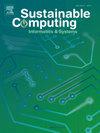Energy-efficient transfer learning for water consumption forecasting
IF 5.7
3区 计算机科学
Q1 COMPUTER SCIENCE, HARDWARE & ARCHITECTURE
引用次数: 0
Abstract
Artificial intelligence is expanding at an unprecedented rate due to the numerous advantages it provides to all types of businesses and industries. Water utilities are adopting artificial intelligence models to optimize water management in cities nowadays. However, the substantial computational demands of artificial intelligence present challenges, particularly regarding energy consumption and environmental impact. This paper addresses this problem by proposing a transfer learning approach for water consumption forecasting that reduces computational time, energy usage, and CO emissions. The proposed methodology consists in developing a transfer learning approach based on a deep learning model already trained for a task with similar characteristics such as predicting electricity consumption. Thus, a pre-trained deep learning model designed for electricity consumption prediction is adapted to the water consumption domain, leveraging shared characteristics between these tasks. Experiments are conducted to determine the optimal amount of knowledge transfer and compare the performance of this approach with other state-of-the-art time-series forecasting models. Using real data from a water company in Spain, the transfer learning model achieves a similar or better accuracy than the other methods, while demonstrating significantly lower computational times, energy consumption and CO emissions. In addition, a scalability analysis has been conducted leading to the conclusion that the proposed transfer learning model is highly suitable to deal with big data. These findings highlight the potential of transfer learning as a sustainable and scalable solution for big data challenges in water management systems.
用水预测的节能迁移学习
人工智能正在以前所未有的速度扩张,因为它为所有类型的企业和行业提供了众多优势。如今,水务公司正在采用人工智能模型来优化城市的水管理。然而,人工智能的大量计算需求带来了挑战,特别是在能源消耗和环境影响方面。本文通过提出一种用于用水量预测的迁移学习方法来解决这个问题,该方法减少了计算时间、能源使用和二氧化碳排放。所提出的方法包括开发一种基于深度学习模型的迁移学习方法,该模型已经训练用于具有类似特征的任务,例如预测电力消耗。因此,为电力消耗预测设计的预训练深度学习模型适用于水消耗领域,利用这些任务之间的共享特征。通过实验来确定最优的知识转移量,并将该方法与其他最先进的时间序列预测模型的性能进行比较。使用来自西班牙一家水务公司的真实数据,迁移学习模型达到了与其他方法相似或更好的准确性,同时显示出更低的计算时间、能耗和二氧化碳排放。此外,对迁移学习模型进行了可扩展性分析,得出迁移学习模型非常适合处理大数据的结论。这些发现突出了迁移学习作为水管理系统中大数据挑战的可持续和可扩展解决方案的潜力。
本文章由计算机程序翻译,如有差异,请以英文原文为准。
求助全文
约1分钟内获得全文
求助全文
来源期刊

Sustainable Computing-Informatics & Systems
COMPUTER SCIENCE, HARDWARE & ARCHITECTUREC-COMPUTER SCIENCE, INFORMATION SYSTEMS
CiteScore
10.70
自引率
4.40%
发文量
142
期刊介绍:
Sustainable computing is a rapidly expanding research area spanning the fields of computer science and engineering, electrical engineering as well as other engineering disciplines. The aim of Sustainable Computing: Informatics and Systems (SUSCOM) is to publish the myriad research findings related to energy-aware and thermal-aware management of computing resource. Equally important is a spectrum of related research issues such as applications of computing that can have ecological and societal impacts. SUSCOM publishes original and timely research papers and survey articles in current areas of power, energy, temperature, and environment related research areas of current importance to readers. SUSCOM has an editorial board comprising prominent researchers from around the world and selects competitively evaluated peer-reviewed papers.
 求助内容:
求助内容: 应助结果提醒方式:
应助结果提醒方式:


